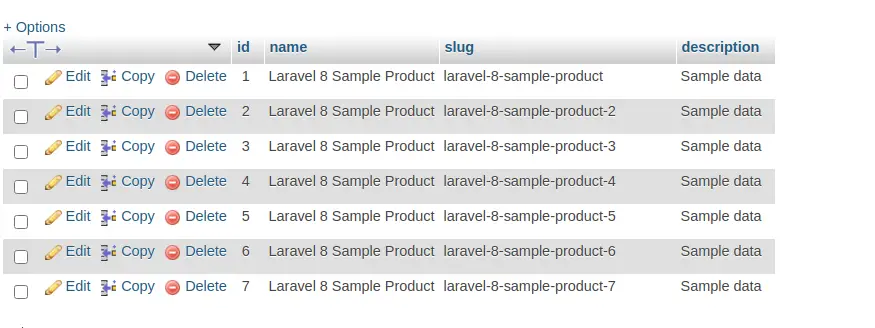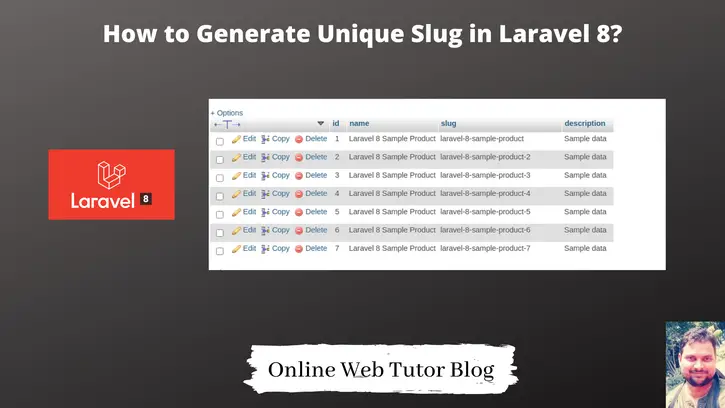Inside this article we will see the concept of generate unique slug in laravel 8. It will be very easy to get the concept and implement in laravel 8 application.
We can use this same concept of slug generation with other versions of laravel as well. Inside this tutorial also we will understand how to generate unique slug in laravel using eloquent model events.
Let’s get started.
Laravel Installation
We will create laravel project using composer. So, please make sure your system should have composer installed. If not, may be this article will help you to Install composer in system.
Here is the command to create a laravel project-
composer create-project --prefer-dist laravel/laravel blog
To start the development server of Laravel –
php artisan serve
URL: http://127.0.0.1:8000
Assuming laravel already installed inside your system.
Create Database & Connect
To create a database, either we can create via Manual tool of PhpMyadmin or by means of a mysql command.
CREATE DATABASE laravel_app;
To connect database with application, Open .env file from application root. Search for DB_ and update your details.
DB_CONNECTION=mysql DB_HOST=127.0.0.1 DB_PORT=3306 DB_DATABASE=laravel_app DB_USERNAME=root DB_PASSWORD=root
Create Model & Migration
Open project into terminal and run this command to create model and migration file.
Model file is one which helps application to communicate with database table and migration file creates schema of table.
$ php artisan make:model Product -m
This command create two different files – a Model file and a Migration file. -m is for migration file.
- Proudct.php model file /app/Models
- 2021_03_15_030914_create_products_table.php Migration file at /database/migrations.
Open {timestamp}_create_products_table.php migration file and write this update code.
<?php
use Illuminate\Database\Migrations\Migration;
use Illuminate\Database\Schema\Blueprint;
use Illuminate\Support\Facades\Schema;
class CreateProductsTable extends Migration
{
/**
* Run the migrations.
*
* @return void
*/
public function up()
{
Schema::create('products', function (Blueprint $table) {
$table->id();
$table->string("name", 70);
$table->string("slug", 100)->nullable();
$table->text("description")->nullable();
});
}
/**
* Reverse the migrations.
*
* @return void
*/
public function down()
{
Schema::dropIfExists('products');
}
}- We are creating a products table with columns – name, slug & description
Migrate Migration
Back to terminal and run this artisan migrate command to run all pending migrations.
$ php artisan migrate
Open Product.php and write this updated code.
<?php
namespace App\Models;
use Illuminate\Database\Eloquent\Factories\HasFactory;
use Illuminate\Database\Eloquent\Model;
use Illuminate\Support\Str;
class Product extends Model
{
use HasFactory;
protected $fillable = [
'name', 'slug', 'description'
];
public $timestamps = false;
/**
* Boot the model.
*/
protected static function boot()
{
parent::boot();
static::created(function ($product) {
$product->slug = $product->createSlug($product->name);
$product->save();
});
}
/**
* Write code on Method
*
* @return response()
*/
private function createSlug($name)
{
if (static::whereSlug($slug = Str::slug($name))->exists()) {
$max = static::whereName($name)->latest('id')->skip(1)->value('slug');
if (isset($max[-1]) && is_numeric($max[-1])) {
return preg_replace_callback('/(\d+)$/', function ($mathces) {
return $mathces[1] + 1;
}, $max);
}
return "{$slug}-2";
}
return $slug;
}
}- whereSlug is dynamic method created from the name of column. where{ColumnName}. whereName() is for name column.
Here, we are checking that, slug should be unique of each inserted product.
Examples for some slug
laravel-8-product-upload laravel-8-product-upload-2 laravel-8-product-upload-3 laravel-8-product-upload-4
Create Controller
Open terminal and run this artisan command to create controller file.
$ php artisan make:controller ProductController
It will create a file ProductController.php at /app/Http/Controllers folder.
Open controller file and write this code into it.
<?php
namespace App\Http\Controllers;
use Illuminate\Http\Request;
use App\Models\Product;
class ProductController extends Controller
{
public function index()
{
$product = Product::create([
"name" => "Laravel 8 Sample Product",
"description" => "Sample data"
]);
dd($product);
}
}- Create & Save product into database table “products”.
- Automatically the boot method what we have created in Product model will be used.
- Product::create(), we have passed name and description value and also slug value automatically comes from model and will insert into table.
Create Route
Open web.php from /routes folder.
use App\Http\Controllers\ProductController;
//...
Route::get('product', [ProductController::class, 'index']);
//...Application Testing
Run this command into project terminal to start development server,
php artisan serveURL – http://127.0.0.1:8000/product
When you hit this url multiple times, it will insert new product rows inside products table. One thing we can notice is here about generated slug value. It is unique for all rows.

We hope this article helped you to learn about Generate Unique Slug in Laravel 8 in a very detailed way.
If you liked this article, then please subscribe to our YouTube Channel for PHP & it’s framework, WordPress, Node Js video tutorials. You can also find us on Twitter and Facebook.
Read more